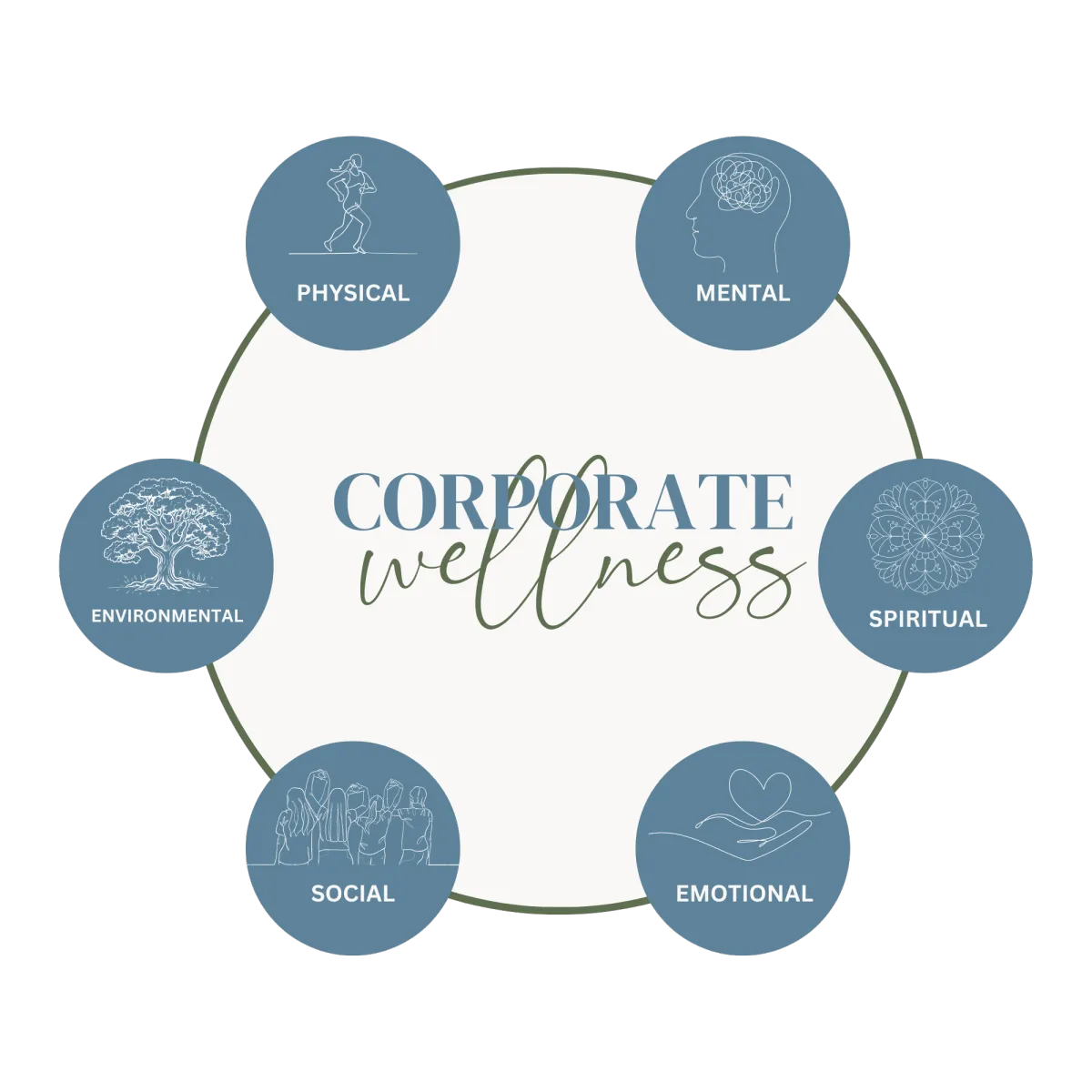
Australian businesses are now very aware that healthy, happy and connected employees offer them a
highly competitive commercial advantage.
Forward thinking employers ensure they effectively integrate employee wellness programs into their organisational fabric, cultivating positive behavior's and fostering a supportive culture that also addresses their governance requirements - from a legal, compliance, risk management and corporate social responsibility perspective.
We work with your business or department to understand, identify, manage and genuinely nurture and improve your
staff's health, wellbeing and potential,
and strengthen the internal connections, team bonding and ultimate success of your business in the process.
A WIN, WIN FOR BUSINESS AND EMPLOYEES!

We tailor our program to meet your needs. Our services include:
✅Identifying your Corporate Psychosocial Hazards and providing the guidance, tools and training your business needs to effectively manage them.
✅Understanding and effectively addressing the wider realm of internal psychosocial risks and compliance obligations (beyond OHS) - including Privacy Laws, Menopause friendly practices, Respect@Work, new Disconnect laws, Anti-discrimination, Harassment and Bullying, Fair Work practices including safe processes for domestic and family violence leave applications.
✅Assisting to develop the leadership, culture, knowledge, training, support & reporting obligations required.
✅Providing Workplace Health & Wellness Solutions and assisting to implement and manage them as required.
✅Creating tailored Wellness Programs that suit your personnel (including working with your business to develop and present your yearly wellness calendar, programs and promotion).
✅Improving staff connection, inclusivity, respect and relationships internally through the wellness programs and conga-line program.
Meet Our Team
Our team provides genuine and practical expertise in
psychosocial and wellness support, which will ensure your program is
truly effective, engaging and compliant:
✅Governance experts- Risk, Compliance & Board advisory
✅Training personnel
✅Psychologists with psychosocial expertise
✅External counsellors
✅Leadership and culture change experts
✅Human Resource experts
✅Men's support networks
✅Domestic Violence support and behaviour management specialists
✅Health and Wellness experts with specialists in oncology, menopause, grief, mental health
& separation/divorce support, nutrition, breathwork, yoga.

Susan Crain
Susan has a Law Degree and majored in Psychology, Counselling, Dispute Resolution. She has completed her Graduate Diploma in Corporate Governance and has advised Boards and Management on Corporate Health and Wellness, Compliance, Risk Management, and Complaints Management. She has received numerous Corporate Training Awards and runs successful Women's Wellness Events.
Susan has held board and board sub-committee positions with organisation's including Act for Kids, Greening Australia and Open Haven Ltd. She has worked as inhouse counsel for many Australian and New Zealand companies and most recently has been a consultant to Radford HR.m She has trained organisations including Tattersalls, Daimler Chrysler, Mater Hospital. She is also a Separation/Divorce support coach, author, and owner of Family Counselling Support Network and Separation Support Network.
Susan has seen first hand how highly effective corporate health and wellness programs can make an enormous impact on businesses operations, governance, profits and most importantly, their people.
Natalie Knight
Natalie has been practising as a Psychologist since 2001 and is a member of the Australian Association of Psychologists (AAPI). She is passionate about working with people and has a particularly strong interest in stress and burnout management, anxiety, trauma, resilience and designing and facilitating high quality physical and mental health and wellness awareness workshops.
Natalie applies her wealth of knowledge, training and expert psychological expertise to create scientifically supported and measurable service delivery to meet your business and staff needs.


Claire Kelly
Claire is a very well regarded and highly skilled nurse consultant, educator, and health and wellness coach, specialising in oncology/cancer and peri/menopause wellness. She has an extensive background in practice, education and training, program development and care coordination - working with women, workplaces and health professionals to support them with their unique menopause, cancer and midlife health needs. We are honoured to have her on our women's wellness panel.
www.middlehealth.com.au



CORPORATE TRAINING - psychosocial, health and wellness
National workplace safety legislation means the Board members and all employers must now take steps legally to identify, minimise or where possible, eliminate psychosocial hazards in the workplace. Psychosocial hazards refers to aspects of work which have the potential to cause psychological or physical harm.
Corporate Wellness Solutions offer small to large Australian businesses and government departments, education, training, frameworks, systems and programs in psychosocial hazard identification and management, which extends beyond compliance with just OHS. Our programs enable your organisation to legally and effectively address other specific Australian legislation and recommended best practices, which have a direct impact on employee psychological and/or physical harm. This includes but is not limited to Respect@Work, Right to Disconnect, Privacy, Fair Work Act, Domestic Violence leave applications, Menopause friendly initiatives, Anti-Discrimination, Harassment and Bullying.
We work with your organisation to develop really effective and engaging wellness programs that genuinely support your personnel. Our programs are able to be tailored according to the unique needs of each organisation and can be delivered online or in person to reach employees in the office, working from home, on the road, on-site, or in remote and regional areas.
Our trainers are not only human resource specialists, psychologists, counsellors, menopause coaches, domestic violence support personnel and wellness trainers, they are also experienced lawyers, compliance and governance experts who have trained staff, leaders and board members Australia wide.
We ultimately take the stress out of psychosocial related compliance, training and wellness programs for your business. We offer a diverse range of corporate wellness offerings, to inspire and enhance your employees mental and physical wellness, cultivate positive behaviours and provide solutions to foster a supportive and connected work environment.
In turn, our programs have proven to positively impact productivity, staff satisfaction, staff retention and overall business success.

Corporate Wellness Plans
We can make it easier on your business by helping your business to:
🌿Draft a Corporate Wellness Plan and calendar that is tailored to the needs, resources and interests of your employees AND
🌿Ensure the plan/program is easily implemented and maintained by your business to effectively create a wellness culture that is enjoyed and sustainable.

Good governance: Risk Management, Compliance, CSR & Culture
Corporate Governance can be summed up in 4 words - people, purpose, process and performance.
Risk management, compliance, culture and Corporate Social Responsibility (CSR) fall within the realms of Corporate Governance and are all ultimately the responsibility of the Board and Senior Managers.
They all require genuine commitment, resources, processes, training and operational support to be effective. In the event of a breach of any regulatory requirements, a highly effective governance and compliance program and carefully documented risk management system, will potentially be critical to reduce the risk to business and employees, as well as the personal liability risk to Directors and Senior Management.
This includes addressing bullying, harassment, discrimination, and sexual harassment (Respect@work), ensuring workplace health and safety, adherence to wider psychosocial obligations including the appropriate management of domestic violence support requests and a menopause friendly workplace, compliance with fair work processes and procedures, including disconnect legislation, ensuring adequate reward and recognition, and a genuine culture of health and wellness support is embedded.
The extent to which a company implements good governance practices can influence consumer and investor decisions, as well as potential employee, board and human resource outcomes. We provide effective guidelines on your governance obligations, especially as they pertain to health and wellness, in a way that is easily understood, implemented, documented and maintained.

Workshops, Seminars & Events
We run a series of specific health and wellness workshops and can tailor these to meet your business requirements. Most workshops can also be offered in webinar format, as required.
We regularly attend and present at strategic planning days, to assist boards and management to fully understand the realm of governance obligations as they relate to psychosocial culture, compliance, risk management and employee wellness.
Our team attend conferences and retreats to provide wellness workshops and activities, and we provide expert keynote speakers.
Our very popular, conga line program is a successful team bonding initiative, which is presented at many of these events, and has proven to inspire ongoing connection and collaboration, communication, and strengthen relationships within teams.

E-courses and Online Webinars and Training
We offer a range of complimentary e-courses, online webinars and training.
Please contact us for more details.

The Conga-Line Connection Program
Unfortunately, many businesses, especially since Covid-19, have reported a serious decline in internal staff connections. With many staff still enjoying flexible working arrangements, including a much higher number of people now working from home, businesses are struggling to find effective ways to reconnect with their staff and connections within and between teams. This has led to communication breakdown, poor collaboration, isolation, disconnect, lower morale and poor attendance.
Our Conga-Line Connection Program has lots of fantastic, fun and engaging ideas on how to get your staff up and moving again in a supported and connective way, regardless of where they are located.

External Wellness Service Registry
If applicable, we can assess your current external wellness service registry deliverables to determine if they are actually meeting the needs of your staff, merely providing band aid solutions, or at worst, adversely impacting your employees wellness by providing sub-standard service.
We can alternatively (or in conjunction with your external wellness service registry) provide you with access to expert external wellness support in various areas beyond what we offer in our programs and workshops. This includes access to psychologists, counsellors, coaches, peri/menopause support and clinics, men's specific wellness initiatives, domestic violence assistance, separation and divorce support and other key health and wellness service providers as and when your employees may require it.
Read our Blogs

Top Tips for Blended Families
Blended families
If you are part of a blended family, you know that whilst it can be so wonderful, it can present a unique set of legal considerations and potential relationship challenges.
In family law, a 'Blended family', also known as a stepfamily, is a family unit where at least one child is the biological or adopted child of only one parent, and not both. This usually happens when two separate families come together, often through marriage or de facto relationships.
Approximately 12% of couple families with dependent children were classified as either step-families or blended families in the 2021 Australian Federal Census.
Of these, step-families comprised 8% of all couple families with dependent children (182,229 families), while blended families made up 4% (99,564 families).
Legal tips to consider for Blended Families
When families merge through new relationships, forming a ‘blended family’, a range of unique legal scenarios can arise. Understanding these can help ensure everyone’s rights and responsibilities are upheld.
In Australia, The Family Law Act 1975 sets out the rights and responsibilities of parents and step-parents, including matters related to children’s living arrangements, financial support, and decision-making.
Additionally, state and territory laws may also apply in specific situations.
While the fundamental principles of family law remain consistent between a traditional and blended family, their application can vary in blended families:
- Step-parent generally don’t have the same automatic parental rights as biological parents. However, if you live with your stepchildren and their parent, you have a responsibility to care for them as you would your own children. This includes providing for their basic needs, ensuring their safety and well-being and contributing generally to their upbringing. It may, in some instances, also include financial obligations.
- Parental rights in a blended family are usually primarily based on what is in the best interests of the child (as required for a traditional family).
- While biological parent’s parental rights and responsibilities are clearly defined under The Family Law Act (custody, decision making and financial support) these rights can be recognised by the Family Courts if the step-parent has been a very significant caregiver or if there are formal agreements made between the biological parents and the step-parent through court orders or agreements.
- Step-parents may need to seek court orders for parental responsibility or establish their standing through de facto relationships.
Child Support Payments and Blended Families
- In most cases, the amount of child support that a person or their former partner is liable to pay will not change if they remarry or enter into a new relationship. You should however carefully check with child support as it is a complex calculation.
- A parent can successfully change their child support assessment by showing special circumstances for example if they are supporting other children (it will potentially reduce their capacity to pay child support).
- If you have an existing child support agreement and your family situation changes due to a new relationship, it’s important to review and potentially update the agreement.
- If the child's birth mother remarries and her new partner wants to adopt the child, the birth parents are usually responsible for raising the child. The new stepfather is not liable for children who are not his biological children, and the biological parent may still be required to make regular child support contributions.
Adopting a step-child
- One of the most significant legal steps that a step-parent can take is to adopt their step-child. This is a complex process that involves a number of legal steps, but it can provide many benefits for both the child and the step-parent. Adoption gives the step-parent legal recognition as the child’s parent and provides them with the same rights and responsibilities as a biological parent.
- There are different laws and rules of eligibility that need to be complied with in order to adopt. You should seek legal advice.
Wills & Estates for Blended Families
When someone with a blended family passes away and leaves their entire estate or a large part of it to some family members, but not to others, it can put their estate at risk of an excluded family member(s) can legally challenge the distribution of the deceased person's assets.
Family members who are not adequately provided for in a Will are often entitled and eligible to make a claim against the deceased person's estate, even if they are not blood related.
Custody when a blended family relationship breaks down
Custody arrangements in blended families usually rely on the existing custody agreements or orders from previous relationships. The child’s biological or adoptive parents usually hold primary custody rights, determining where the child lives and making major decisions about their upbringing.
However, step-parents can obviously play a significant role in a child’s life, and arrangements for visitation or shared care can still be negotiated or ordered by the court.
These arrangements are often made with the child’s best interests as the paramount consideration. Factors like the child’s age, their relationship with each parent and step-parent, and the stability of each household are all considered. Communicating openly with all parties involved is crucial to create a plan that works for everyone.
We recommend you seek legal advice in relation to any of these more complex 'blended family' issues.
Key Emotional Challenges of blended family
The first step to improving your blended family problems is to identify if things aren’t blending well. Here are some signs to look out for:
Step-siblings don’t get along and there is a lot of fighting or lack of any communication/interraction
When jealousy rears its head between the children or even partners and their step child
Family gatherings and meal time are tense and uncomfortable
When parenting styles don’t align and you cannot agree on rules for the household
When the children develop new behavioural issues
Your step children wont listen or respect your authority.
Your step-children only ask their biological parent for permission and help and don't come to you - or vice versa with your partner.
When there is an obvious split in the household rather than a ‘blend’
Tips to Resolving Blended Family Problems
Don’t panic. It can take some time and there are strategies you can you take to address the issues you may have mixing your families.
Show a united front
Children will usually be led by their parent’s example and if you and your partner aren’t completely unified, chances are the kids will follow. Make sure that you and your partner put in the effort to stay consistent and act together. Don’t contradict each other’s rules or negate each other’s parenting styles.
It may take a lot of long, even difficult, conversations to get on the same page about the rules and standards you want to put in place for your household. This is an effort that is not only worth making but is absolutely critical to make in order to allow your blended family to truly blend.
Respect the old ways
Transitioning to a blended family can feel very threatening for children who may fear the loss of a previous life that they were attached to. Respect the traditions that you had before to give them more comfort.
Start new family traditions
Find common ground between what both sides of the family like for example pizza night Tuesday and BBQ Sunday. Let your kids take an active part and even lead the way forward so they feel invested in and excited by their family’s future instead of alienated by it.
It won’t just happen overnight
Change takes time. Respect and validate each others feelings, especially the children. Try to have really calm open communication - talk things out openly instead of sweeping them under the rug. You’re all in this together, and the process may understandably take some time to get a happy rhythm.
Family Counselling help
Sometimes family problems go beyond what you can be addressed at home. A Family Counsellor can really assist families to find strategies to work together to resolve issues and find ways to work together and better communicate.
Utilising family dispute mediation services can also be beneficial. These services provide a supportive and neutral environment for families to discuss and resolve conflicts, with the aim of reaching a mutually agreed outcome.

